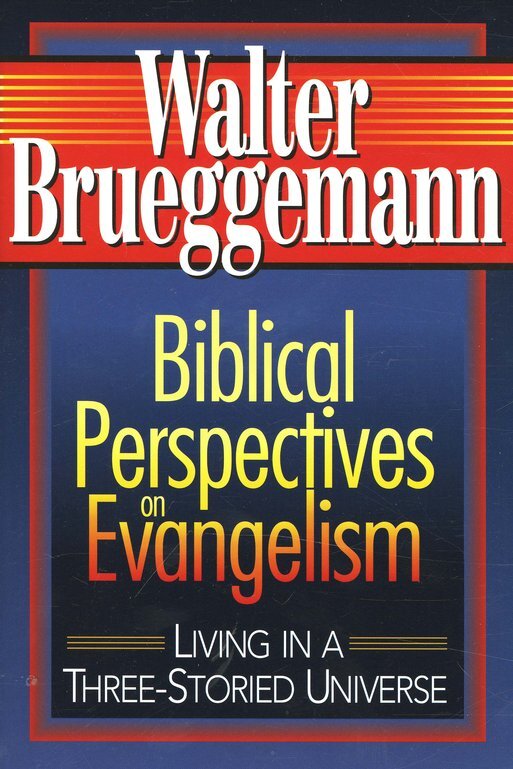Walter Brueggemann, Biblical Perspectives on Evangelism: Living in a Three-Storied Universe. Abingdon Press, 1993.
Referenced in: Theology and Practice of Evangelism – Missional/Missio Dei
LifeandLeadership.som Summary
Though this book was not intended to be “missional,” in that it was published before the missional conversation begain, it represents a view of evangelism that resonates with the missional perspective. Typical of Brueggeman, it operates from a sense of continuity between the testaments, and fits the church’s present activities into the grand historical narrative of scripture.
The book consists of four chapters. For those who like to read previews before taking in an entire book, the conclusion which starts on page 129 is a great place to start before going to each chapter.
In chapter one, Brueggeman presents the basic framework of “Evangelism in Three Unfinished Scenes.” These scenes, or dramatic acts, are: 1) God’s victory over the forces of chaos and death, 2) the announcement of that victory, and 3) its appropriation by those who hear the announcement. He demonstrates how this three-fold sequence is re-enacted many times in scripture. Many will see that while Brueggeman never explicitly says so, this theology of evangelism clearly emerges from a Christus Victor view of the atonement.
Two primary points follow (37). First, each of the three scenes must be kept distinct, instead of collapsing everything about evangelism into the second scene of announcement. Second, the entire drama of evangelism is definitionally unfinished. The gospel is not a “done deal,” but is a deal always to be done again in the face of resilient evil, distortion, and alienation.
This leads to three implications with regard to evangelism. First, it removes the dichotomy between “evangelism” (announcement) and “social action” (appropriation). Both are necessary components. “We cannot have announcement without appropriation or appropriation without announcement.” (43) Second, it addresses false disputes between liberals and conservatives, i.e. “whenever liberals shrink the epistemological scandal of the gospel and whenever conservatives shrink from the public dimension of the faithful language of the evangel, the gospel is distorted and the Bible is misread.” (44) Third, it reveals that church growth and evangelism are not synonymous.
“Evangelism is never aimed at institutional enhancement and aggrandizement. It is aimed simply and solely at summoning people to new, liberated obedience to the true governor of all created reality…The church grows because more and more persons change allegiance, switch worlds, accept the new governance and agree to the unending and difficult task of appropriating the news in practical ways. ‘Church growth’ misserves evangelism, however, when the church is allied with consumerism, for then the church talks people out of the very obedience to which the news summons us.” (45)
In chapters two through four, Brueggeman applies this framework to three different situations, or three different “candidates” for evangelism. In chapter two, “Outsiders Become Insiders,” he launches from the great meeting of Joshua 24 with regard to the people of God and their relationship to the “Canaanites.” In chapter three, “Forgetters Made Rememberers,” he uses Ezra’s work in Nehemiah 8 where members were “’re-tented’ into the passionate vision of risk and vulnerability that is decisive for the community.” (94) In chapter four, “Beloved Children Become Belief-ful Adults,” he addresses the process by which children of believers may or may not become “consenting adults,” stressing the importance of the church being with and for its children.
This text is written is Brueggeman’s typical engaging style and profound insight. It is easy to appreciate his contributions to the subject from his vantage point.
From the Publisher
In this timely and provocative work, Walter Brueggemann applies his experience and skills in the area of biblical interpretation to the theme of evangelism. He argues for the importance of considering afresh how the Bible itself thinks and speaks about evangelism, how it enacts the dramatic claims of the “good news.”
Brueggemann here describes evangelism as a drama in three scenes, concerning (1) God’s victory over the forces of chaos and death, (2) the announcement of that victory, and (3) its appropriation by those who hear the announcement. This same dramatic sequence, as he shows, is many time re-enacted in the Bible; the times and circumstances of the re-enactment may differ, but the essential message, as well as the structure of its presentation, remains the same.
About the Author
Walter Brueggemann is William Marcellus McPheeters Professor of Old Testament Emeritus at Columbia Theological Seminary. He is a leading interpreter of the Old Testament and is the author of numerous books, including Westminster John Knox Press best sellers such as Genesis and First and Second Samuel in the Interpretation series, An Introduction to the Old Testament: The Canon and Christian Imagination, and Reverberations of Faith: A Theological Handbook of Old Testament Themes.
***For additional information on this resource, including reviews, click the bookstore links. Check the reference at page top or the links below for resource guides on related topics.***
Related Areas
See Other Resources on Evangelism:
See Resources on Over 100 Areas of Ministry Leadership:


